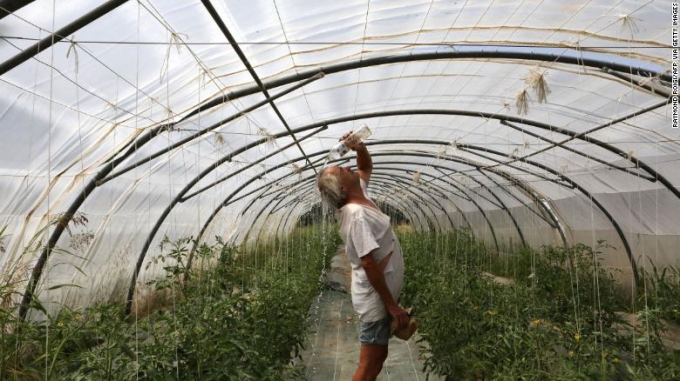November 27, 2025 | 23:48 GMT +7
November 27, 2025 | 23:48 GMT +7
Hotline: 0913.378.918
November 27, 2025 | 23:48 GMT +7
Hotline: 0913.378.918

A farmer pours water on his face as he works in a greenhouse in southern France on June 17 as western Europe struggles with a heatwave.
Such was the heat that England's upscale Royal Ascot Racecourse even saw a rare change of protocol: guests were allowed to shed hats and jackets once the royals had passed.
"Avoid over-exposing to the sun, hydrate and take care of the most vulnerable so they don't suffer from heat stroke," was the advice from Spanish Prime Minister Pedro Sanchez in Madrid during an event, fittingly, about desertification.
Temperatures reached 40 degrees Celsius (104 Fahrenheit) in Madrid on Friday, the national weather agency AEMET said. A level not seen so early in the year since 1981.
Northern Italian regions risk losing up to half their agricultural output due to a drought, a farm lobby said, as lakes and rivers start to run dangerously low, jeopardizing irrigation.
The federation of Italian utility companies, Utilitalia, warned this week that the country's longest river, the Po, was experiencing its worst drought for 70 years, leaving many sections of the vast, northern waterway completely dried up.
The heatwave piled pressure on energy systems as demand for air-conditioning risks driving prices higher, adding to the challenge of building up stocks to protect against any further cuts to Russian gas supplies.
'Health risk'
In France, the Gironde department around Bordeaux prohibited public events including concerts and those at indoor venues without air conditioning, a local official said.
"Everyone now faces a health risk," Gironde prefect Fabienne Buccio told France Bleu radio.
Temperatures in many of France's areas hit 40 Celsius for the first time this year on Thursday and were expected to peak on Saturday, climbing to 41-42 Celsius. A record night temperature for June, 26.8 Celsius, was recorded in Tarascon, southern France.
Fourteen administrative departments were on red alert, with schoolchildren told to stay at home in these areas. Speed limits were lowered in several regions, including around Paris, to limit exhaust emissions and a buildup of harmful smog.
Britain's weather service said Friday was the hottest day of the year so far, with temperatures above 32 Celsius in some parts of the southeast.
Parks, pools and beaches were packed, and while many enjoyed a day of fun and freedom after two years of periodic pandemic restrictions some were also worried.
"I'm from Cyprus and now in Cyprus it's raining ... and I'm boiling here, so something must change. We need to take precautions about the climate change sooner than later because undoubtedly it's worrying for all of us," said student Charlie Uksel, visiting Brighton, south of London.
"Now we are enjoying it, but for the long-term we might sacrifice."
Mediterranean nations are more and more concerned about how climate change may affect their economies and lives.
"The Iberian peninsula is an increasingly dry area and our rivers' flow is slower and slower," Spanish leader Sanchez added.
Firefighters were battling wildfires in several parts of Spain, with Catalonia in eastern Spain and Zamora near the western border with Portugal the worst hit.
In Zamora, between 8,500 and 9,500 hectares turned to ashes.
The cloud of hot air was sparing Portugal on Friday, where temperatures were not as high as in other European nations, with Lisbon likely to reach 27 Celsius.
However, last month was the hottest May in 92 years, Portugal's weather agency IPMA said. It warned that most of the territory is suffering from a severe drought.
Portugal's reservoirs have low water levels, with the Bravura dam of the most affected at only 15% full.
(CNN)

(VAN) A new study reveals how the simultaneous effects of ocean acidification, salinity and loss of oxygen are making the world more fragile.

(VAN) Hopes are growing that the creation of the first 3D turkey gut model could be a turning point in the battle against the virulent blackhead disease.

(VAN) Tyson, America’s biggest meat supplier, plans to shutter one of its largest beef processing plants as the industry continues to struggle with low cattle supplies and political pressure from Washington.

(VAN) New FAO study shows how digital solutions are empowering farmers and fishers to prevent losses and build resilient agrifood systems.

(VAN) Brazil's COP30 presidency pushed through a compromise climate deal on Saturday that would boost finance for poor nations coping with global warming but that omitted any mention of the fossil fuels driving it.

(VAN) Poultry farmers in the UK have been warned that they could face one of the worst winters yet for bird flu.

(VAN) Prices of main-crop paddy have risen sharply, with jasmine rice hitting 16,100 baht per tonne — the highest level in years.